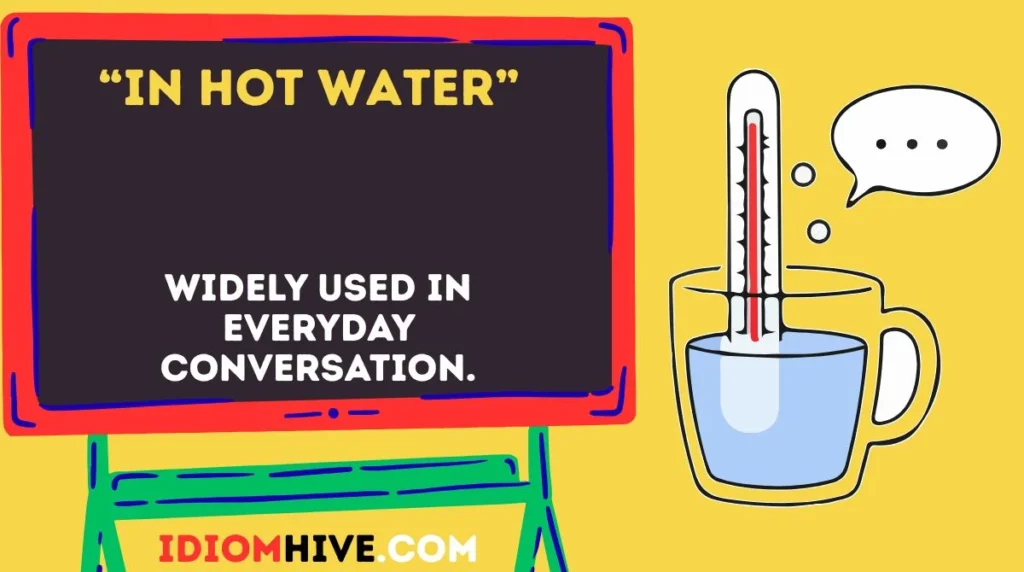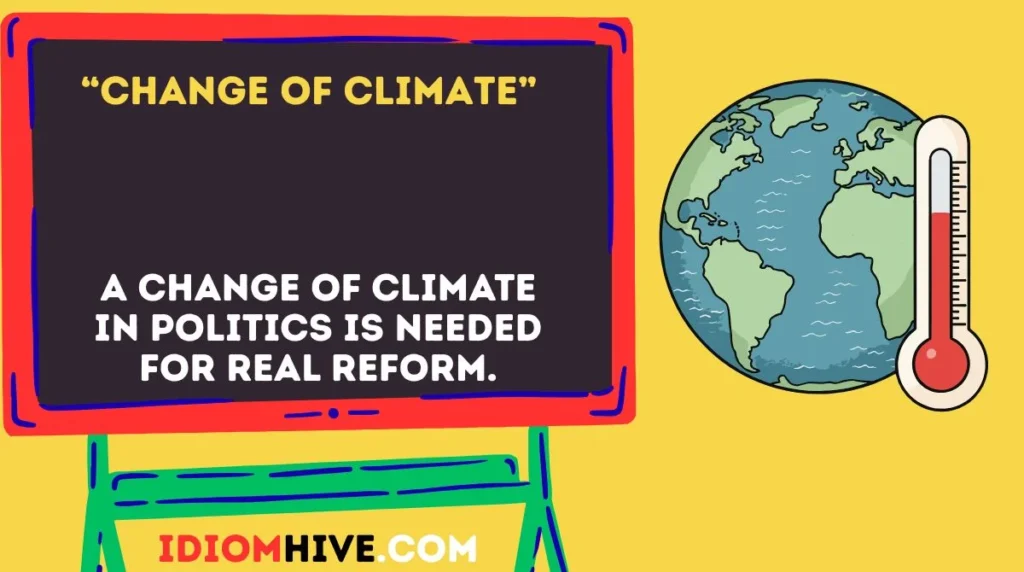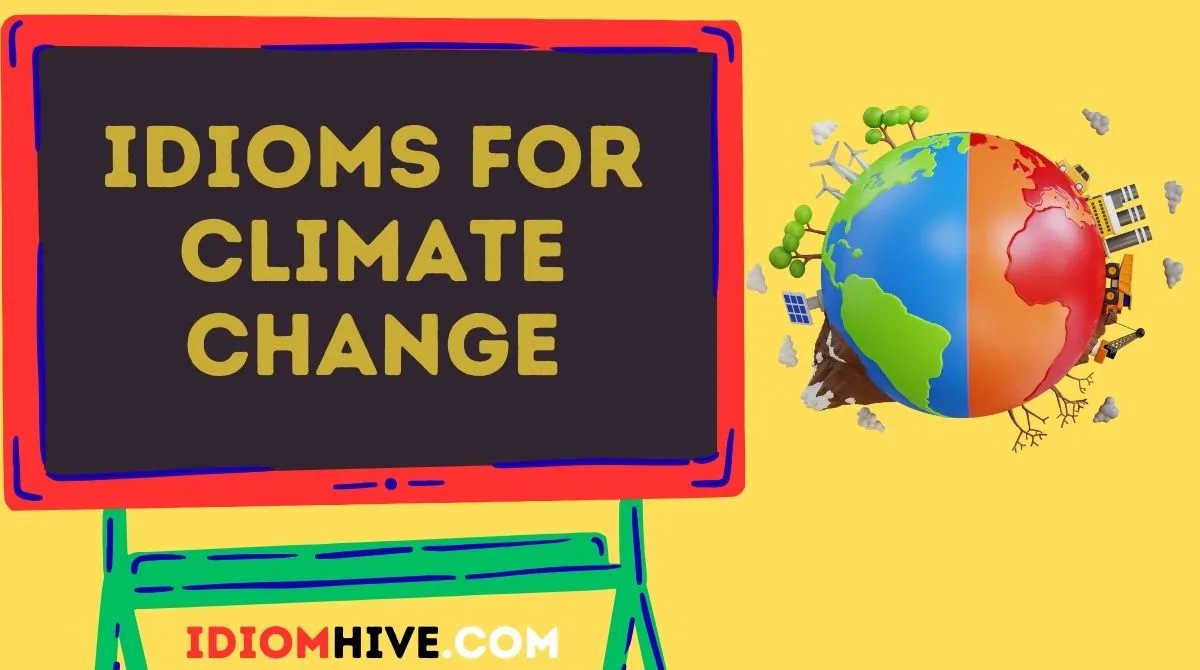Language is full of colorful expressions that help us describe the world around us. These expressions, called idioms, go beyond literal meanings and create vivid images in our minds.
When it comes to climate change, idioms are especially powerful because they connect complex environmental issues with everyday speech. By using them, you can express concern, urgency, or awareness in a more engaging way.
Idioms related to climate change are useful in English for conversations, news writing, academic discussion, or even creative storytelling.
They make the topic easier to understand and help communicate feelings about global warming, unpredictable weather, and environmental challenges.
Whether you are a student, teacher, journalist, or language learner, mastering these idioms can boost your communication skills and help you talk about one of the most pressing issues of our time.
Did You Know?
The English phrase “climate of opinion” originally had nothing to do with weather—it meant the general mood or attitude of people. Later, idioms involving climate, storm, and heat became linked with the real climate crisis, reflecting society’s growing awareness of environmental change.
Idioms About Heat and Rising Temperatures
“The heat is on”
Meaning: Pressure is building; urgent action is needed.
Sentence: With rising sea levels, the heat is on for governments to act.
Alternative: Under pressure
Reflection: Common in both casual and professional talk.
“Hot under the collar”
Meaning: Angry or upset about something.
Sentence: Environmentalists get hot under the collar when climate pledges are ignored.
Alternative: Worked up
Reflection: Often used informally in discussions.
“Hot button issue”
Meaning: A subject that causes strong emotions and debate.
Sentence: Climate change is a hot button issue in politics.
Alternative: Controversial topic
Reflection: Common in media and public debates.
“Heating up”
Meaning: Becoming more intense or serious.
Sentence: The climate debate is heating up across the world.
Alternative: Escalating
Reflection: Useful in daily and professional contexts.
“In hot water”

Meaning: In trouble or facing criticism.
Sentence: Companies are in hot water for polluting rivers.
Alternative: Facing backlash
Reflection: Widely used in everyday conversation.
“Feel the heat”
Meaning: Experience stress or pressure.
Sentence: Politicians feel the heat when protests demand climate action.
Alternative: Under fire
Reflection: Informal but common.
“Like a furnace”
Meaning: Extremely hot conditions.
Sentence: Summers now feel like a furnace in many cities.
Alternative: Scorching hot
Reflection: Often used in casual speech about weather.
“If you can’t stand the heat, get out of the kitchen”
Meaning: If you can’t handle pressure, step away.
Sentence: Leaders must face challenges—climate change proves that if you can’t stand the heat, get out of the kitchen.
Alternative: Step aside if unfit
Reflection: More proverbial, often in debates or advice.
Idioms About Storms and Extreme Weather
“Storm brewing”
Meaning: Trouble or conflict is coming.
Sentence: Scientists warn a storm is brewing if emissions continue unchecked.
Alternative: Trouble ahead
Reflection: Works in both formal and informal speech.
“Perfect storm”
Meaning: A rare combination of bad events creating disaster.
Sentence: Rising seas, heatwaves, and deforestation create a perfect storm.
Alternative: Worst-case scenario
Reflection: Popular in news writing.
“Calm before the storm”
Meaning: A peaceful time before chaos begins.
Sentence: The calm before the storm ended with a deadly hurricane.
Alternative: Temporary peace
Reflection: Used metaphorically in many settings.
“Weather the storm”
Meaning: Survive a difficult situation.
Sentence: Communities must weather the storm of climate change together.
Alternative: Endure hardship
Reflection: Common in motivational speech.
“Throw caution to the wind”
Meaning: Act carelessly without thinking of consequences.
Sentence: Some companies throw caution to the wind when exploiting natural resources.
Alternative: Reckless behavior
Reflection: Informal, often critical.
“Every cloud has a silver lining”
Meaning: Even bad situations can have positives.
Sentence: The climate crisis pushes innovation—every cloud has a silver lining.
Alternative: Good in bad
Reflection: Optimistic, often in speeches.
“Head in the clouds”
Meaning: Not paying attention to reality.
Sentence: Leaders with no climate policy have their heads in the clouds.
Alternative: Daydreaming
Reflection: Informal but widely used.
“Storm in a teacup”
Meaning: A small issue exaggerated.
Sentence: Some deny climate change as just a storm in a teacup.
Alternative: Making a fuss
Reflection: Mostly informal.
“Lightning never strikes twice”
Meaning: Rare disasters don’t happen repeatedly.
Sentence: Climate change proves lightning can strike more than once.
Alternative: Unlikely repeat
Reflection: Used metaphorically in warnings.
“Ride out the storm”
Meaning: Survive until things improve.
Sentence: Coastal towns are preparing to ride out the storm.
Alternative: Hang in there
Reflection: Common in serious contexts.
Idioms About Cold, Ice, and Change
“Ice melting”
Meaning: Situation softening or changing.
Sentence: Talks on climate policy show the ice melting between rivals.
Alternative: Breaking the ice
Reflection: Used both literally and metaphorically.
“Break the ice”
Meaning: Start conversation or reduce tension.
Sentence: Environmental groups break the ice with creative campaigns.
Alternative: Ease tension
Reflection: Popular in social situations.
“Cold comfort”
Meaning: Small or weak relief in a bad situation.
Sentence: Small promises are cold comfort for flood victims.
Alternative: Poor consolation
Reflection: Often used in criticism.
“Frozen in place”
Meaning: Unable to act.
Sentence: Governments seem frozen in place while the planet warms.
Alternative: Paralyzed with fear
Reflection: Common in critical or motivational contexts.
“Tip of the iceberg”
Meaning: A small visible part of a bigger problem.
Sentence: Extreme weather is only the tip of the iceberg of climate change.
Alternative: Hidden danger
Reflection: Widely used in media.
“Walking on thin ice”
Meaning: Taking a risky action.
Sentence: Ignoring rising temperatures is walking on thin ice.
Alternative: Playing with fire
Reflection: Popular in everyday speech.
“Snowball effect”
Meaning: A small issue growing into something bigger.
Sentence: Melting glaciers create a snowball effect on global warming.
Alternative: Domino effect
Reflection: Used in both casual and academic talk.
“Snowed under”
Meaning: Overwhelmed by tasks.
Sentence: Scientists are snowed under with climate data.
Alternative: Buried in work
Reflection: Informal, often workplace use.
Idioms About Global Responsibility and Action
“Drop in the ocean”
Meaning: A very small amount compared to what’s needed.
Sentence: Planting a few trees is a drop in the ocean without global action.
Alternative: Tiny contribution
Reflection: Common in climate discussions.
“Make waves”
Meaning: Cause a strong impact or disruption.
Sentence: Young activists are making waves in climate movements.
Alternative: Shake things up
Reflection: Informal but powerful.
“Change of climate”

Meaning: A shift in atmosphere or conditions.
Sentence: A change of climate in politics is needed for real reform.
Alternative: New atmosphere
Reflection: Used metaphorically in discussions.
“Clear the air”
Meaning: Resolve tension or misunderstanding.
Sentence: Climate talks aim to clear the air between nations.
Alternative: Settle things
Reflection: Common in diplomacy.
“Under the weather”
Meaning: Feeling unwell.
Sentence: The planet itself is under the weather due to human activity.
Alternative: Sick
Reflection: Informal but adaptable.
“Cast a shadow”
Meaning: Create worry or sadness.
Sentence: Droughts cast a shadow over farmers’ futures.
Alternative: Darken prospects
Reflection: Often used in literature and news.
“Go green”
Meaning: Adopt eco-friendly habits.
Sentence: More companies go green to fight climate change.
Alternative: Eco-friendly lifestyle
Reflection: Everyday and professional contexts.
“Ray of sunshine”
Meaning: A hopeful or positive sign.
Sentence: Renewable energy is a ray of sunshine in climate solutions.
Alternative: Bright spot
Reflection: Optimistic and uplifting.
“Like a breath of fresh air”
Meaning: Something new and refreshing.
Sentence: Youth-led climate movements are like a breath of fresh air.
Alternative: New energy
Reflection: Informal and expressive.
“In the wind”
Meaning: Something expected to happen.
Sentence: Big climate policy changes are in the wind.
Alternative: On the horizon
Reflection: Neutral, often used in forecasts.
“Green light”
Meaning: Permission to go ahead.
Sentence: The government gave the green light for solar projects.
Alternative: Approval
Reflection: Common in business and politics.
How to Use These Idioms in Daily Life
- Speaking: Use climate idioms in conversations to make your ideas more vivid. For example: “This policy is just a drop in the ocean.”
- Writing: In essays, articles, or reports, idioms like “perfect storm” or “tip of the iceberg” make your arguments stronger.
- Professional usage: In presentations or meetings, idioms such as “weather the storm” or “green light” show confidence and clarity.
Common Mistakes Learners Make With Idioms
- Wrong context
❌ “The ice melting between us is a perfect storm.”
✔️ “The ice is melting between us after our talk.” - Mixing idioms
❌ “He is under the hot water.”
✔️ “He is in hot water.” - Literal misunderstanding
❌ “A drop in the ocean means we should stop trying.”
✔️ “A drop in the ocean means effort is too small, but more is needed.”
FAQs
1. Why are idioms important when talking about climate change?
They make language more powerful and help explain serious issues in a simple, memorable way.
2. Are climate change idioms used only in environmental discussions?
No, many of these idioms are flexible and can be used in daily life, politics, or even business.
3. Can idioms make academic writing informal?
Yes, overuse can make it informal. Use them wisely to add emphasis, not replace facts.
4. Do native speakers use these idioms often?
Absolutely. Idioms like “tip of the iceberg” or “drop in the ocean” are common in everyday speech.
5. How can I practice idioms effectively?
Try using one new idiom daily in your writing or conversations until it feels natural.
Conclusion
Climate change is one of the greatest challenges of our time, and idioms give us a creative way to talk about it. From “the heat is on” to “drop in the ocean,” these expressions help us explain urgency, hope, and responsibility in simple yet powerful language.
Using idioms makes communication more engaging and memorable, whether you are discussing the environment with friends, writing essays, or giving a presentation.
Start practicing these idioms today, and you’ll not only improve your English but also connect more deeply with global conversations about saving our planet.










